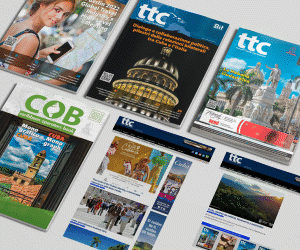By Frank Martin
The world hopes that 2021 will be the year of the defeat of the dark Covid-19 by superheroes who will be unforgettable from that moment: vaccines.
The world tourism industry is among the many crucial economic sectors that cannot wait any longer for the outcome.
In many parts of the planet, borders have already begun to gradually open pending the full activation of various vaccines against the coronavirus.
The path of planetary tourism will, however, still be winding until then.
Many experts say it will take the longest to adjust the entertainment industry to new circumstances.
The “new reality” at airports will impose stringent standards related to the health of travelers.
In fact, the air terminals are already imposing the first.
The reason is that the coronavirus could smuggle into a tourist destination and destroy it.
The vaccines, after coming to the rescue, will maintain their prestige as superheroes for a long time. Maybe forever.
In the current cautious openings, negative certificates of PCR tests are already required to enter a country.
Immunization certificates would soon be crucial.
Coronavirus vaccines are likely to become a similar standard for international flights.
Along with the spectacular announcements of the application of the first vaccines, the debate has also arisen on an issue: should they or should not be mandatory to cross borders as they are today, for example, passports and visas?
Some even predict that such an obligation could “kill the tourism industry” or at least cause it great difficulties.
“Counterproposals” defend an effective system to detect without long delays and border checks if a traveler is properly vaccinated.
In the middle of the Caribbean region, the island of Aruba announced that it will begin to use a system to assess whether each visitor is healthy from next February.
Dangui Oduber, Minister of Health, Tourism and Sports recently stated that that country is executing a so-called “pilot plan” with the airline JetBlue Airways Corp. to carry out tests on infections.
But neither in Aruba nor anywhere else that is known is a mandatory vaccination already planned.
Computers at the service of superheroes begin to appear on stage.
Digital detection systems are already in use at the Rome airport, in some destinations in the United States, and others are planned to be installed in Singapore and Hong Kong in 2022.
The issue is more complicated than it seems because probably a majority of the people in the world are eager to be vaccinated, but there are many who fear the “puncture”.
In the United Kingdom, a pioneer country in vaccination against Covid-19, one in five citizens say they are unlikely to be vaccinated.
According to research published there, those who refuse to receive the drug are citing a variety of different reasons.
Who will win the controversy?
The bad news for those who do not want to receive the vaccine whatever it may be is that the pandemic caused a deep drop in international tourist arrivals worldwide until now.
This has brought the leisure sector and the national economies that live on it – thousands – to the brink of economic disintegration.
And well-founded hopes for a speedy recovery from international travel are now based on what some describe as a silver bullet against a terrible and destructive vampire: vaccinated.

MORE NEWS











